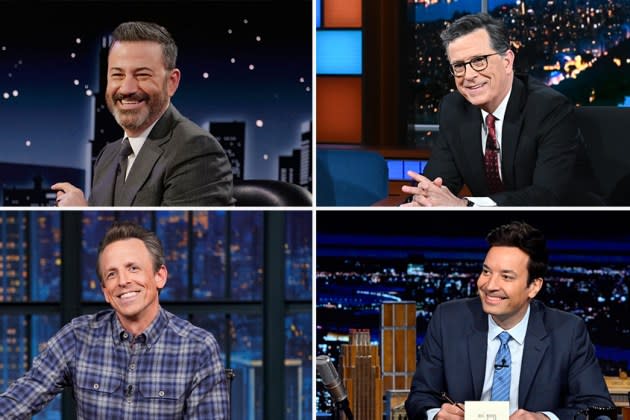Late Night Talk Shows Return: Fallon, Kimmel, Colbert, Meyers and Oliver Set Comebacks

TV’s late-night hosts plan to return to regular production as of Monday, October 2, ending a months-long pause in a national routine caused by Hollywood labor troubles.
Jimmy Fallon, Stephen Colbert, Seth Meyers and Jimmy Kimmel intend to restart their programs on that date, with HBO’s John Oliver poised to offer a new broadcast of “Last Week Tonight” on HBO on Sunday October 1. The five hosts revealed their intentions via a social-media post on Wednesday, following an announcement by Bill Maher that he intended to offer a new broadcast of “Real Time” on HBO this Friday.
More from Variety
'Real Time with Bill Maher' Set to Return This Friday, After Last Week's Decision to Push Pause
New WGA Contract Explained: AI Is Not a Writer, Solo Scribe Shows Don't Need Minimum Staff and More
Some late-night plans remain unknown. Comedy Central, which had been relying on a series of guest hosts for its “Daily Show,” has yet to unveil a plan to relaunch that series. CBS is expected to announce a new entry to replace James Corden’s “Late Late Show” at 12:30 a.m.
Some of the hosts have appeared eager to get back to their wee-hours antics. The five aforementioned late-night personalities have been producing a regular podcast, “Strike Force Five,” part of a bid to be able to weigh in on current events as well as generate ad revenue that might help pay their out-of-work staffs. Jimmy Fallon has been spotted on social media making segments about cooking, for example. NBC’s listings for repeats of its “Late Night with Seth Meyers” often include a nod to the writers behind segments of each rebroadcast.
All the late-night shows face new headwinds and challenges. The young viewers who once flocked to David Letterman and Jon Stewart have begun to move elsewhere after TV’s late local news, and often view late-night bits and skits via social media — a behavior that is harder for the TV networks to monetize.
TV’s late-night programs continue to generate discussion and the threads of popular culture. But the longer shows like NBC’s “Saturday Night Live” and ABC’s “Jimmy Kimmel Live” remain dark, the more risk there is of viewers in the era of streaming video making permanent changes to their consumption habits. In 2018, seven late night programs — NBC’s “Tonight” and “Late Night,” CBS’ “Late Show” and “Late Late Show,” ABC’s “Jimmy Kimmel Live,” Comedy Central’s “Daily Show” and NBC’s “Saturday Night Live” — drew more than $698 million in advertising in 2018, according to Vivvix, a tracker of ad spending. By 2022, that total came to $412.7 million — a drop of approximately 41% over five years.
Best of Variety
Sign up for Variety’s Newsletter. For the latest news, follow us on Facebook, Twitter, and Instagram.

